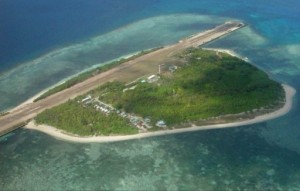US, PH to hold strategic talks amid tensions in disputed sea
MANILA, Philippines—The Philippines and the United States will be holding strategic bilateral talks on defense and the rule of law amid heightened tensions in the disputed West Philippine Sea.
In a press briefing for reporters, Carlos Soreta, Assistant Secretary for the Office of American Affairs, said that the third Bilateral Strategic Dialogue—to be held Dec. 11 to 12—would tackle the subjects of defense; economics and trade; rule of law; and regional and global issues.
Soreta said the talks would be chaired by Foreign Affairs Undersecretary Erlinda Basilio, whom President Benigno Aquino III had earlier delegated as the country’s new Ambassador to China, and National Defense Undersecretary Pio Lorenzo Batino for the Philippine government; and State Department Assistant Secretary Kurt Campbell and Defense Assistant Secretary Mark Lippert for the US.
When asked whether the talks would center around the issue of disputes involving the West Philippine Sea, Soreta said, “It’s very hard to disassociate this meeting with what’s happening in the West Philippine Sea.”
The disputes among claimant countries have heightened in recent weeks, with a report of China’s plan to board and seize ships that enter what it claims to be its territory in the disputed sea.
China claims nearly the entire sea, while the Philippines, Malaysia, Brunei, Vietnam and Taiwan claim parts of the area, believed to be the site of oil and gas deposits.
Article continues after this advertisementChina’s purported plan came days after it issued new passports bearing a map showing China’s nine-dash claims in the West Philippine Sea. Both the Philippines and Vietnam have refused to stamp the Chinese e-passports in protest of China’s claims, and have also sought China’s clarification on its new maritime patrol rules.
Article continues after this advertisementThe United States, whose military is “pivoting” to Asia after the wars in Iraq and Afghanistan, is also seeking clarification of the new rules.
Soreta explained that the foremost agenda for defense was the increased rotational presence of American troops in the country. He clarified, however, that discussions for now concentrated on “more presence and activities in areas that are agreed upon by both parties.”
“Working groups will be discussing strategic guidelines on how this increased rotational presence could enhance the humanitarian and disaster relief dimension of our activities,” Soreta said.
Soreta stressed that the country was thankful to the US for its commitment to contribute to the peace and stability in the region, the rule of law and the strength of the United Nations Convention on the Law of the Sea (UNCLOS).
“But for our part, we believe the increased rotational presence helps give us the diplomatic space of which to work some of our legal and political strategies… it gives us some strategic breathing space to engage other parties in trying to help solve our problem,” Soreta said.
Soreta said that the Philippines and US shared deep values and that given that, “we feel that the US would be more prone to promote peace, to promote rule of law than what others might say is to promote their own interests.”
He also emphasized that the said talks, as part of diplomacy, should not be a cause for alarm for any region.
Manila has consistently called for a peaceful resolution to the dispute according to international law, but China has insisted that disputes should be dealt with using bilateral negotiations.
Soreta said the Philippines seeks the settlement of disputes through the rule of law, and that he believed the US was the appropriate country to talk about this.
He said that it was clear that the United States was engaged in the region, and that it sent the right signal that states must behave in a reasonable way and in a lawful way.
He said that he believed that improving the country’s relations with the US “puts us in a better position,” but that with or without the US, the Philippines would maintain its stand and claims to the West Philippine Sea.
“The last thing we want to do is for the conflict to heat up but the price of that is not us giving up on our claim there,” Soreta said.
For comprehensive coverage, in-depth analysis, visit our special page for West Philippine Sea updates. Stay informed with articles, videos, and expert opinions.
